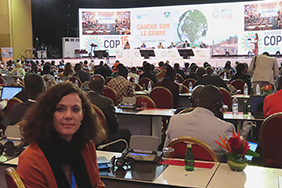10 May 2022

“We have to do a better job of tapping the synergies between the three Rio Conventions”
From 9 to 20 May 2022, 197 parties are meeting for the UNCCD COP15. The goal is to halt desertification, land degradation, and drought, and to preserve land for future generations. In the interview Nicole Harari, CDE researcher and member of WOCAT's executive team, explains the issues.